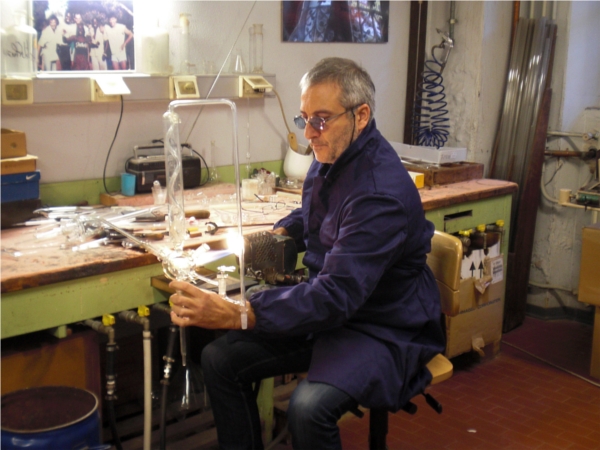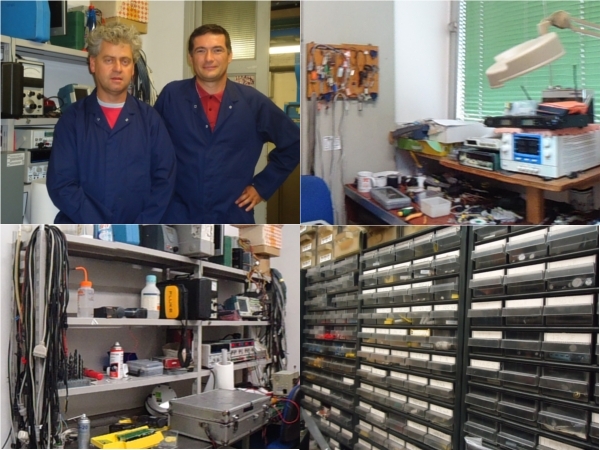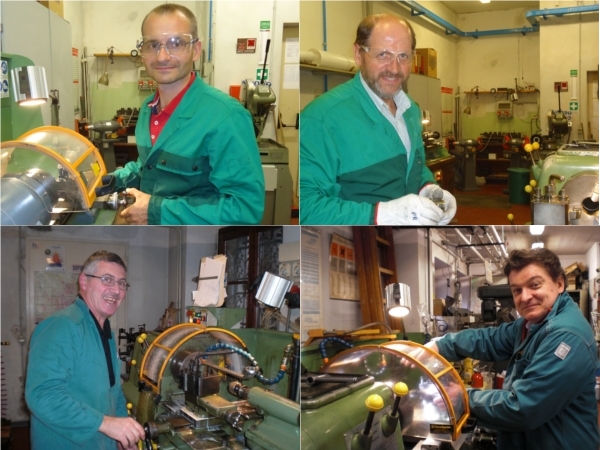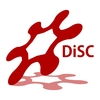
Technical Laboratories
Research and teaching activities can rely on a number of technical laboratories at the Department of Chemical Sciences. The DiSC technical laboratories support the development of new devices and prototypes, the maintenance of the actual services networks and the fixing of the instruments. Their activities extend from the glassblowing to the mechanical, from the electric through the electronic to the automation. The technical laboratories have been developed in synergy with the growth of the department itself, from the very foundation of the experimental science of chemistry in the University of Padova to the new requests of the interdisciplinary nature of the frontiers of science and technology. The DiSC Technical Laboratories are deeply interconnected with each other, in order to deliver an integrated service to scientists, on the basis of the close-knit team of technical experts. The highly flexible know-how grown in the DiSC technical laboratories offers support for the technology transfer to the surrounding economy and services to industries where possible.
Glassblowing Workshop

The glassblowing workshop housed at DiSC is equipped with high temperature Herbert Arnold torches (2000°C), glass grinding machine, diamond saw and glass tempering oven (550°C). The DiSC glassblowing workshop is able to work with a wide range of glass materials, including quartz, pyrex, soft glasses and ITO glass. It manages its own stock of precursor materials (quartz tubes, glass adapters, rotaflo® glass and PTFE stopcocks, fritted glass, spherical joint connectors, flat glasses, other connectors) for fast answering to the most common building and fixing requests.
The design and development of reactors, measurement cells and instrument attachments is daily managed in a fast feedback with scientists, in order to focus and satisfy the different research requests and, if necessary, with the other DiSC Technical Laboratories. Particular chemical environments, temperature and pressure conditions as well as mechanical stresses are evaluated and managed in the development of the very new attachments and devices. A wide range of special optical properties can be guaranteed to the glass devices.
The realization of original teaching experiments has been largely supported by ad-hoc developed glassware and apparatuses.
Common schlenk and chemistry laboratories glassware are daily repaired or adapted.
Students training in the management of glassware both in common or in extreme conditions is offered.
Services to industry is furnished where possible.
contacts: mauro.meneghetti@unipd.it ; michele.maggini@unipd.it
location at DiSC: 170-00-021
Electronic Laboratories

Two electronic laboratories are housed at DiSC.
They commonly provide fast repairing of the instruments in the manageable electric and electronic compartments, fixing of analog and digital devices, micro-controllers, electric motors, heaters, sensors.
They are used to design and realize the electronic components of new devices, measurement cells, bespoke instruments attachments as well as the adaptation of commercial instruments to new purposes.
They have large experience in the development of LabView routines for the integration of instruments and the interfacing with computers.
They actually support the teaching activities in the educational chemistry laboratories.
They manage the technical support for the audiovisual facilities of the conferences, meetings and symposia housed at DiSC.
They provide services to industries where possible.
They are equipped with a continuously upgraded park of tools, actually including:
- DC power supplies (GW-Instek GPS-4303, Thurlby Thandar PL310QMT, MCP M10-QD3010);
- Oscilloscopes (Tektronix TPS2024, Tektronix TDS224, Siglent SHS806 equipped with Tektronix P5120 passive high voltage probes);
- Function generator (MCP SG1642B);
- Multimeters (Fluke 289, Fluke 87V, GBC KDM350CFT, Honeytek mod. A17B, Metravi 16 equipped with Fluke 80K-40 high voltage probe);
- Insulation Resistance Tester (Fluke 1507);
- Clamp meters (Fluke36, Lutron DM-6046);
- Computer facilities (ASUS D310MT, Acer TravelMate7720G);
- National Instruments USB6211 acquisition and control interface;
- APC Smart-UPS1000 UPS unit,
- Soft soldering (Philips ES95011, Weller ESP25C 25W 230V);
- Desoldering iron station (Lafayette SSD-15, Sorny Roong Industrial SL-928);
- Tester for Triac/SCR and Variac.
A stock of electronic components is kept updated for fast response to the most common requests.
The DiSC Electronic Laboratories have a particularly flexible know-how on the development of original home-made devices and instruments, thanks to their historical grown in a deep interconnection with the scientists and their continuously updating of the research measurement requests.
Integration of the electronic components of the home-made new devices with their mechanical parts is facilitated by the harmony and proximity with the others DiSC workshops.
contacts: claudio.comaron@unipd.it ; alberto.doimo@unipd.it ; simone.crivellaro@unipd.it ; michele.maggini@unipd.it
location at DiSC: 210-00-034 ; 210-00-035 ; 210-01-123
Mechanical Workshops

Two Mechanical Workshops are housed at DiSC. They are equipped with four lathes (SLIVEN ZMMCU400, SAIMP BSIM, SCHAUBLIN 102 TO), two vertical milling machines SAIMP FVOLA, two vertical drill machines (F.ROSA, OLIVETTI TS15), a circular blade cropper PEDRAZZOLI SPA super brown, two grinding machines TOMMASI & BONETTI equipped with air aspirator and filters, a manual parallel shear machine for flats HYLLUS, a lever shear for flat cuttings ABC UTENSILI, a lever shear for angle profiles, a forming press for flats HYLLUS and a park of micrometers, gauges and the common measurement instruments, including the common mechanical portable electric machine tools.
The DiSC Mechanical Workshops realize a wide range of components to meet the requests from the chemistry research and teaching laboratories. Cells, reactors, housings for cells and sample compartments, supports for the instruments or encapsulation of commercial equipment in special chemical environments, with the control of some physical parameters, ad-hoc developed mobile parts are commonly designed and realized in strict connection with the scientists. A wide range of materials is commonly treated, both metals as stainless steel, brass, aluminum and plastics as PEEK, PVC, PTFE, in order to manage the research necessities, which often include chemically hostile environments, cryogenic or plasma temperatures, high vacuum and high pressure conditions. They provide service to industries where possible.
contacts: lorenzo.dainese@unipd.it ; roberto.inilli@unipd.it ; stefano.mercanzin@unipd.it ; michele.maggini@unipd.it
location at DiSC: 170-00-22; 215-00-134





